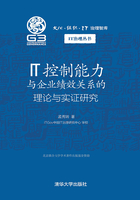
ABSTRACT
Information Technology(IT), which does not create a sustainable competitive advantage to enterprises, but with the integration of IT and business, provides a huge risk to enterprises. The capability of balancing the IT risk and IT value has been the key to sustainable competitive advantage for an enterprise, and is also the forefront topic concerned by the current theory of information management field. Most of the current studies are focused on completing some elements of IT control, but the effective theoretical analytical system or the method, which can guide the enterprise IT control practice, has not yet been established. The purpose of this dissertation is to research the questions of enterprise IT control, and to explore the relationship between the enterprise IT control capability and the enterprise performance, from the perspective of capability.
This dissertation develops the concept of IT control capability, based on enterprise capability theory and internal control theory, and also, builds the structural frame of IT control capability, consisting of IT control basic capability, IT control process capability and IT control learning capability, and analyzes the elements of each sub-capability. After the in-depth analysis of the relationship between the elements of IT control capability and enterprise performance, this dissertation constructs IT control capability and enterprise performance relationship model, brings forward 12 research hypotheses.
For the purpose of processing hypothesis testing, and getting variable data, this dissertation preliminarily designs the measurement model for measuring IT control capability and enterprise performance, based on documents and interviews with experts. This dissertation utilizes the correlation coefficient and variation coefficient of the measure to modify the measurement model, and based on the actual data, exanimates the validity and reliability of the measurement model.
This dissertation utilizes the measurement model to collect enterprise data; uses the Structural Equation Model(SEM)to verify the research hypotheses; adopts the multiple regression method to process the industry difference analysis of the hypotheses among the financial industry, telecommunications and manufacturing industry; utilizes construct validity, statistical conclusions validity and external validity to evaluate of the quality of research conclusions, for proving the reliability of the conclusions.
Empirical hypothesis testing Conclusions: IT control capability on enterprise performance has a significant positive effect. Including: IT control process capability and IT control of learning ability on enterprise performance have a significant direct positive effect; IT control basic capability on enterprise performance has an indirect positive impact on performance through the two intervening variables of IT control process capability and IT control of learning ability.
Industry Comparison Conclusion: IT control capability for financial enterprise provides the maximum contribution to business performance. IT control learning capability for telecommunications and manufacturing industry offers the greatest impact on business performance, IT control process capability for financial industry supplies the greatest impact on enterprise performance.
Finally, this dissertation discusses the practical significance of this research for enterprise IT control theory, and makes recommendations for enterprise training management for IT control capability.
Key words: IT control, IT control capability, Enterprise performance, Relationship, Empirical study